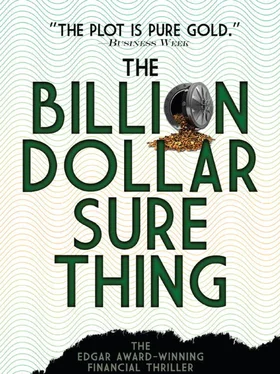In the early days of Rosen’s game, it had been simple. Anybody could walk into any commercial bank in the country, make a transfer to a foreign bank, and the money was gone forever, without a trace. Year after year, billions of dollars had been leaving the United States completely unnoticed. They finally appeared, laconically listed under “Errors and Omissions” in the balance-of-payments statistics of the Department of Commerce. The country which was the ultimate beneficiary of most of such “Errors” was, peculiarly enough, Switzerland. Uncle Sam played into the hands of people like Rosen and his friends for years before catching on. Then things changed. First, the banks had to start reporting all major transfers out of the country. Then the Internal Revenue Service required a listing of all foreign bank accounts as part of the regular income tax return. Finally, in July, 1972, anyone carrying more than $5,000 in cash with him out of the United States had to report it in detail. Suddenly the risks for international financial engineers like Stanley Rosen had become immeasurably greater. That, thought Bernoulli, may be the explanation for Rosen’s Beirut connection. He wants to get some reinsurance in the form of non-American clients. And he must prove himself over here. Make a spectacular showing. Then the clients from the Near East, from Europe, would flock to him, just as the Americans had during the past decade. But in the future, as in the past, it would no doubt be shady money. And in the future, as before, fellows like Rosen would need the secrecy cover of Swiss banks to do their thing. Here was where they were a menace to Switzerland. Their blatant abuse of the facilities offered by Swiss banks could undermine the entire system, a system upon which Swiss prosperity had been built. If it turned out that Stanley Rosen had organized the theft of the gold-dollar plan of the United States government, and if it was discovered that his criminal machinations had been carried out through numbered accounts in Zurich, the Swiss banking system would be dealt a mortal blow. For Bernoulli also knew America. They would not stand for any more of that kind of crap.
Bernoulli decided that it would definitely not help anybody if he stayed in bed any longer. There was one way in which he might be able to cut right through the dilemma facing him: by employment of the most honoured of European police tactics—the confrontation.
First, he would have to tackle Walter Hofer. Then Stanley Rosen. And finally, confront both of them, separately of course, with Rolf Lutz of Swiss Security Consultants. He would get to the bottom of this yet.
Dr. Walter Hofer had also not gotten up immediately after waking on that Thursday morning. For he also had things to think about. His was a position where real difficulties, not to speak of downright public failure, were unthinkable. They had to stay unthinkable. Unfortunately, in recent years the possibility could no longer be dismissed as totally absurd. The men at the top of Rolls Royce had found this out. So had those of Penn Central. Hofer had known men from both companies. They had his sympathy. But his own position was even more difficult. He was a banker. And one thing bankers never do is make a mistake and admit it. They always find a way out. So must he. Well, he thought, I’ll know a lot more in just a few hours.
“Walter,” came his wife’s voice from downstairs. “Will you be ready soon?”
“Yes, Martha. I’ll be down in five minutes. Please go ahead. I’ll join you right away.”
As usual he took an almost cold shower and also as usual donned a dark blue suit. Except for vacations and formal affairs, Dr. Hofer inevitably wore a blue suit. He had twenty-one in his closet. He also wore blue socks, black shoes, and tended toward dark shades of red in his ties. His wife always picked his suits out for him before he rose in the morning. Also his ties. In fact, she also bought them all. The ties, that is. The suits came at the rate of two every month. His tailor brought them up to the house for the last fittings. Martha supervised that part of it. The results were always good.
Within ten minutes Hofer was at the breakfast table.
“Aren’t you going to drink some orange juice this morning?” his wife asked.
“No, just coffee and a sweet roll, Martha.”
“You do feel all right, don’t you, Walter?”
“Of course. Just didn’t sleep too well last night. Probably the Föhn. Anyway, it’s getting near the end of the week. Maybe both of us could just take it easy this weekend. Stay at home and relax. What do you say?” Hofer drank his coffee black. During the past ten years he had not gained a pound. His tailor had told him more than once that he had never seen a man who held his figure so constant for so long.
“Oh yes, Walter. That would be nice for a change. But there is one thing. You must give that talk on Sunday evening in Altdorf to the Ecumenical Society. But I know you always enjoy those meetings. So I’m sure it won’t take much preparation.”
“I’d forgotten about that. You’re right, though. I should be able to draft that out on Sunday morning. Tell me, do they expect a good crowd?”
“I’m sure so. You know how curious people are about you. Many cannot understand how you find time for church affairs with all the other things you must attend to. Probably some are jealous and come in the hope of seeing you make a fool of yourself.”
“Now Martha. But I must be going. Is Heinrich waiting?”
“Yes, he pulled into the driveway just before you came down.”
“Fine. I must go. I’ll see you around six.”
Walter Hofer gave his wife the usual peck on the cheek and, with a final wave of the hand, disappeared into the back seat of the bank limousine.
The early morning traffic up the right bank of the Lake of Zurich was extremely heavy and the road narrow.
“And how are you this morning, Heinrich?” Hofer asked his chauffeur.
“Couldn’t be better, sir. Won exactly 526 francs in the football pool yesterday. Hit ten out of twelve correctly. The wife and I went out last night for dinner to celebrate. First time we’ve done that during the week for years. You ever try the pools, sir?”
“No, I’m afraid not, Heinrich. I wouldn’t even know how to fill out one of those coupons,” said Hofer, laughing. “Anyway, just imagine if I hit the jackpot and it got all over the papers. That wouldn’t do at all.”
“No, you’re right, sir.”
“Quite a bit of fog, this morning. When do you expect to get to the bank?”
“It’ll thin out as usual within a kilometre or two. We’ll be there in about fifteen minutes.”
In exactly fourteen minutes they passed the front of the massive entrance to the General Bank of Switzerland and, after rounding the corner, disappeared into the huge underground parking facility.
“Will you be needing me this morning?” asked the chauffeur as Hofer stepped out.
“No. I’ll see you down here around five-thirty this afternoon. And don’t worry about the weekend, Heinrich. I will be staying at home, so feel free to work out anything you might have in mind with the family.”
“Thank you, sir, I’ll do that. I think I’ll take the boy to the football game on Sunday. Quarter finals in the European Cup, you know.”
But Dr. Hofer had already turned his mind to other things as he walked to the elevators.
“ Guten Tag , Herr Doktor.”
“ Guten Tag , Herr Doktor.”
The morning ritual. Hofer merely tipped his hat to his people.
“ Guten Tag , Herr Doktor.” This time it was Kellermann.
“Herr Kellermann. Say, would you perhaps join me for a moment in the elevator.”
When the next elevator arrived, the growing group of incoming executives waited respectfully as Hofer waved Kellermann into the lift. No one else joined them. It was an unwritten rule of the bank that Dr. Walter Hofer always went first class, in splendid isolation.
Читать дальше












